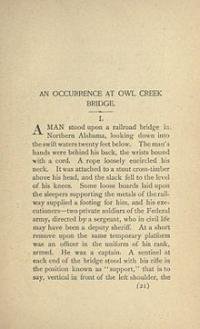Ambroz Birs - An Adventure at Brownville
Here you can read online Ambroz Birs - An Adventure at Brownville full text of the book (entire story) in english for free. Download pdf and epub, get meaning, cover and reviews about this ebook. year: 1892, genre: Prose. Description of the work, (preface) as well as reviews are available. Best literature library LitArk.com created for fans of good reading and offers a wide selection of genres:
Romance novel
Science fiction
Adventure
Detective
Science
History
Home and family
Prose
Art
Politics
Computer
Non-fiction
Religion
Business
Children
Humor
Choose a favorite category and find really read worthwhile books. Enjoy immersion in the world of imagination, feel the emotions of the characters or learn something new for yourself, make an fascinating discovery.

- Book:An Adventure at Brownville
- Author:
- Genre:
- Year:1892
- Rating:3 / 5
- Favourites:Add to favourites
- Your mark:
- 60
- 1
- 2
- 3
- 4
- 5
An Adventure at Brownville : summary, description and annotation
We offer to read an annotation, description, summary or preface (depends on what the author of the book "An Adventure at Brownville " wrote himself). If you haven't found the necessary information about the book — write in the comments, we will try to find it.
An Adventure at Brownville — read online for free the complete book (whole text) full work
Below is the text of the book, divided by pages. System saving the place of the last page read, allows you to conveniently read the book "An Adventure at Brownville " online for free, without having to search again every time where you left off. Put a bookmark, and you can go to the page where you finished reading at any time.
Font size:
Interval:
Bookmark:
An Adventure at Brownville
(1892) by Ambrose Bierce
I taught a little country school near Brownville, which, as every one knows who has had the good luck to live there, is the capital of a considerable expanse of the finest scenery in California. The town is somewhat frequented in summer by a class of persons whom it is the habit of the local journal to call "pleasure seekers," but who by a juster classification would be known as "the sick and those in adversity." Brownville itself might rightly enough be described, indeed, as a summer place of last resort. It is fairly well endowed with boarding-houses, at the least pernicious of which I performed twice a day (lunching at the schoolhouse) the humble rite of cementing the alliance between soul and body. From this "hostelry" (as the local journal preferred to call it when it did not call it a "caravanserai") to the schoolhouse the distance by the wagon road was about a mile and a half; but there was a trail, very little used, which led over an intervening range of low, heavily wooded hills, considerably shortening the distance. By this trail I was returning one evening later than usual. It was the last day of the term and I had been detained at the schoolhouse until almost dark, preparing an account of my stewardship for the trusteestwo of whom, I proudly reflected, would be able to read it, and the third (an instance of the dominion of mind over matter) would be overruled in his customary antagonism to the schoolmaster of his own creation.
I had gone not more than a quarter of the way when, finding an interest in the antics of a family of lizards which dwelt thereabout and seemed full of reptilian joy for their immunity from the ills incident to life at the Brownville House, I sat upon a fallen tree to observe them. As I leaned wearily against a branch of the gnarled old trunk the twilight deepened in the somber woods and the faint new moon began casting visible shadows and gilding the leaves of the trees with a tender but ghostly light.
I heard the sound of voicesa woman's, angry, impetuous, rising against deep masculine tones, rich and musical. I strained my eyes, peering through the dusky shadows of the wood, hoping to get a view of the intruders on my solitude, but could see no one. For some yards in each direction I had an uninterrupted view of the trail, and knowing of no other within a half mile thought the persons heard must be approaching from the wood at one side. There was no sound but that of the voices, which were now so distinct that I could catch the words. That of the man gave me an impression of anger, abundantly confirmed by the matter spoken.
"I will have no threats; you are powerless, as you very well know. Let things remain as they are or, by God! you shall both suffer for it."
"What do you mean?"this was the voice of the woman, a cultivated voice, the voice of a lady. "You would notmurder us."
There was no reply, at least none that was audible to me. During the silence I peered into the wood in hope to get a glimpse of the speakers, for I felt sure that this was an affair of gravity in which ordinary scruples ought not to count. It seemed to me that the woman was in peril; at any rate the man had not disavowed a willingness to murder. When a man is enacting the role of potential assassin he has not the right to choose his audience.
After some little time I saw them, indistinct in the moonlight among the trees. The man, tall and slender, seemed clothed in black; the woman wore, as nearly as I could make out, a gown of gray stuff. Evidently they were still unaware of my presence in the shadow, though for some reason when they renewed their conversation they spoke in lower tones and I could no longer understand. As I looked the woman seemed to sink to the ground and raise her hands in supplication, as is frequently done on the stage and never, so far as I knew, anywhere else, and I am now not altogether sure that it was done in this instance. The man fixed his eyes upon her; they seemed to glitter bleakly in the moonlight with an expression that made me apprehensive that he would turn them upon me. I do not know by what impulse I was moved, but I sprang to my feet out of the shadow. At that instant the figures vanished. I peered in vain through the spaces among the trees and clumps of undergrowth. The night wind rustled the leaves; the lizards had retired early, reptiles of exemplary habits. The little moon was already slipping behind a black hill in the west.
I went home, somewhat disturbed in mind, half doubting that I had heard or seen any living thing excepting the lizards. It all seemed a trifle odd and uncanny. It was as if among the several phenomena, objective and subjective, that made the sum total of the incident there had been an uncertain element which had diffused its dubious character over allhad leavened the whole mass with unreality. I did not like it.
At the breakfast table the next morning there was a new face; opposite me sat a young woman at whom I merely glanced as I took my seat. In speaking to the high and mighty female personage who condescended to seem to wait upon us, this girl soon invited my attention by the sound of her voice, which was like, yet not altogether like, the one still murmuring in my memory of the previous evening's adventure. A moment later another girl, a few years older, entered the room and sat at the left of the other, speaking to her a gentle "good morning." By her voice I was startled: it was without doubt the one of which the first girl's had reminded me. Here was the lady of the sylvan incident sitting bodily before me, "in her habit as she lived."
Evidently enough the two were sisters.
With a nebulous kind of apprehension that I might be recognized as the mute inglorious hero of an adventure which had in my consciousness and conscience something of the character of eavesdropping, I allowed myself only a hasty cup of the lukewarm coffee thoughtfully provided by the prescient waitress for the emergency, and left the table. As I passed out of the house into the grounds I heard a rich, strong male voice singing an aria from "Rigoletto." I am bound to say that it was exquisitely sung, too, but there was something in the performance that displeased me, I could say neither what nor why, and I walked rapidly away.
Returning later in the day I saw the elder of the two young women standing on the porch and near her a tall man in black clothingthe man whom I had expected to see. All day the desire to know something of these persons had been uppermost in my mind and I now resolved to learn what I could of them in any way that was neither dishonorable nor low.
The man was talking easily and affably to his companion, but at the sound of my footsteps on the gravel walk he ceased, and turning about looked me full in the face. He was apparently of middle age, dark and uncommonly handsome. His attire was faultless, his bearing easy and graceful, the look which he turned upon me open, free, and devoid of any suggestion of rudeness. Nevertheless it affected me with a distinct emotion which on subsequent analysis in memory appeared to be compounded of hatred and dreadI am unwilling to call it fear. A second later the man and woman had disappeared. They seemed to have a trick of disappearing. On entering the house, however, I saw them through the open doorway of the parlor as I passed; they had merely stepped through a window which opened down to the floor.
Cautiously "approached" on the subject of her new guests my landlady proved not ungracious. Restated with, I hope, some small reverence for English grammar the facts were these: the two girls were Pauline and Eva Maynard of San Francisco; the elder was Pauline. The man was Richard Benning, their guardian, who had been the most intimate friend of their father, now deceased. Mr. Benning had brought them to Brownville in the hope that the mountain climate might benefit Eva, who was thought to be in danger of consumption.
Font size:
Interval:
Bookmark:
Similar books «An Adventure at Brownville »
Look at similar books to An Adventure at Brownville . We have selected literature similar in name and meaning in the hope of providing readers with more options to find new, interesting, not yet read works.
Discussion, reviews of the book An Adventure at Brownville and just readers' own opinions. Leave your comments, write what you think about the work, its meaning or the main characters. Specify what exactly you liked and what you didn't like, and why you think so.


